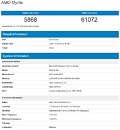Thursday, June 13th 2019

AMD's Upcoming $750 Ryzen 9 3950X (16C, 32T) Shown Beating Intel's $2,000 i9-9980XE (18C, 36T)
When we said AMD was readying a presentation on their Ryzen 9 3950X CPUs to awe crowds at E3, we weren't thinking of something of this magnitude. But apparently, it's true: a Geekbench test result has shown AMD's $750, 16 core, 32 thread Ryzen 9 9 3950X beating Intel's 18 core, 36 thread $2,000 i9-9980XE monster. Now, you may be thinking: ok, it beat it because of AMD's announced 4.7 GHz boost, and did so only on single threaded performance, obviously... but you would be wrong.
The Geekbench scores show AMD's Ryzen 9 3950X delivering 5,868 points in single, and 61,072 points in multicore workloads. Intel's i9-9980XE, on the other hand, scores just 5,391 single core, and 46,876 multicore points (on average and at stock clocks of 3,000 MHz base and 3,400 MHz boost). This is an incredible performance difference (particularly in the multicore score), and was apparently done with an engineering sample for AMD's upcoming chip that didn't even run at its announced 4.3 GHz base and 4.7 GHz boost clocks, but at 3.3 GHz and 4.3 GHz respectively. AMD's 105 W TDP, 16 core chip beats Intel's 185 W TDP, 18 core one... Where has the world come? Take the usual dosage of NaCl, and let's keep things in perspective - even if AMD's Ryzen 9 3950X equals, and doesn't beat, Intel's i9-9980XE, it's still a huge win for the red company. Almost as big a win as that huge stone on Lisa's hand.
Sources:
Tom's Hardware, Intel i9-9980XE GeekBench score example, GeekBench Ryzen 9 3950X test result
The Geekbench scores show AMD's Ryzen 9 3950X delivering 5,868 points in single, and 61,072 points in multicore workloads. Intel's i9-9980XE, on the other hand, scores just 5,391 single core, and 46,876 multicore points (on average and at stock clocks of 3,000 MHz base and 3,400 MHz boost). This is an incredible performance difference (particularly in the multicore score), and was apparently done with an engineering sample for AMD's upcoming chip that didn't even run at its announced 4.3 GHz base and 4.7 GHz boost clocks, but at 3.3 GHz and 4.3 GHz respectively. AMD's 105 W TDP, 16 core chip beats Intel's 185 W TDP, 18 core one... Where has the world come? Take the usual dosage of NaCl, and let's keep things in perspective - even if AMD's Ryzen 9 3950X equals, and doesn't beat, Intel's i9-9980XE, it's still a huge win for the red company. Almost as big a win as that huge stone on Lisa's hand.

70 Comments on AMD's Upcoming $750 Ryzen 9 3950X (16C, 32T) Shown Beating Intel's $2,000 i9-9980XE (18C, 36T)
Additionally, there should be enough IF b/w at 2:1 as it's supposed to be 2.5 or 3x the speed of Zen+ IIRC. Even if it's "only" 2x, it would be no worse at the 2:1 divider but the RAM (and the IF) will still be going faster vs Z+.
I can't wait to play with it.
What people don't seem to realize is that AMD is clearly still holding back some of their cards. That benchmark where they showed Intel without hardware patches was very intentional - they are excited for the final reviews to make Intel look even worse than they did.
browser.geekbench.com/v4/cpu/13527784
1866.5 (1:1 mode) * (512/8) * 2 lanes = 238.912GB/s
- Maximum DDR4 bandwidth at 1866 (3733MT): 1866.5 * (128/8) * 2 = 59.728GB/s
- IF bandwidth is well in excess of maximum DDR4 speed
2000/2 (1:2 mode) = 1000 * (512/8) * 2 lanes = 128GB/s
- Maximum DDR4 bandwidth at 2000MHz (4000MT): 2000 * (128/8) * 2 = 64GB/s
- bandwidth isn't an issue, but since IF speed is halved, latency increases slightly
These numbers exclude overhead costs.
I'm still not clear on if the SDF is a 512-bit bidirectional link (2 lanes). I'm assuming it is for this exercise.
7980XE Geekbench result
I know it will be out only on September
Well, he may have had to sign a NDA, so he probably won't tell us much until we are closer to launch. Besides, I'd wait until at least a few major tech sites have their reviews ready.
What?
Sounds like nearby same as our street "Myrtle" Road Sheffield UK. LOL
Some have seemed to suggest that the latest Intel CPUs have less performance degradation because there are some baked-in mitigations, in hardware. I want clarification about that in any performance comparison between Intel and AMD until it's no longer relevant. I want hyperthreading to be disabled on any Intel parts that require that for full security, in any performance comparison, so people can see what the impact is.That's nice for that artificial financial instrument's empty pursuit of profit, I suppose. I'd rather have reality taken into full account, not marketing magic hold the day. Right now, reality appears to be that we have serious performance regressions due to serious security vulnerabilities. Those need to be taken into account in all performance appraisals. Now, not later.